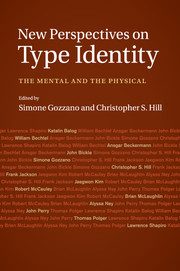Book contents
- New Perspectives on Type Identity
- New Perspectives on Type Identity
- Copyright page
- Dedication
- Contents
- Contributors
- Acknowledgements
- Introduction
- Chapter 1 Acquaintance and the mind–body problem
- Chapter 2 Identity, reduction, and conserved mechanisms: perspectives from circadian rhythm research
- Chapter 3 Property identity and reductive explanation
- Chapter 4 A brief history of neuroscience’s actual influences on mind–brain reductionism
- Chapter 5 Type-identity conditions for phenomenal properties
- Chapter 6 Locating qualia: do they reside in the brain or in the body and the world?
- Chapter 7 In defence of the identity theory mark I
- Chapter 8 The very idea of token physicalism
- Chapter 9 About face: philosophical naturalism, the heuristic identity theory, and recent findings about prosopagnosia
- Chapter 10 On justifying neurobiologicalism for consciousness
- Chapter 11 The causal contribution of mental events
- Chapter 12 Return of the zombies?
- Chapter 13 Identity, variability, and multiple realization in the special sciences
- Index
Chapter 4 - A brief history of neuroscience’s actual influences on mind–brain reductionism
Published online by Cambridge University Press: 05 April 2012
- New Perspectives on Type Identity
- New Perspectives on Type Identity
- Copyright page
- Dedication
- Contents
- Contributors
- Acknowledgements
- Introduction
- Chapter 1 Acquaintance and the mind–body problem
- Chapter 2 Identity, reduction, and conserved mechanisms: perspectives from circadian rhythm research
- Chapter 3 Property identity and reductive explanation
- Chapter 4 A brief history of neuroscience’s actual influences on mind–brain reductionism
- Chapter 5 Type-identity conditions for phenomenal properties
- Chapter 6 Locating qualia: do they reside in the brain or in the body and the world?
- Chapter 7 In defence of the identity theory mark I
- Chapter 8 The very idea of token physicalism
- Chapter 9 About face: philosophical naturalism, the heuristic identity theory, and recent findings about prosopagnosia
- Chapter 10 On justifying neurobiologicalism for consciousness
- Chapter 11 The causal contribution of mental events
- Chapter 12 Return of the zombies?
- Chapter 13 Identity, variability, and multiple realization in the special sciences
- Index
Summary
- Type
- Chapter
- Information
- New Perspectives on Type IdentityThe Mental and the Physical, pp. 88 - 110Publisher: Cambridge University PressPrint publication year: 2012
- 7
- Cited by



